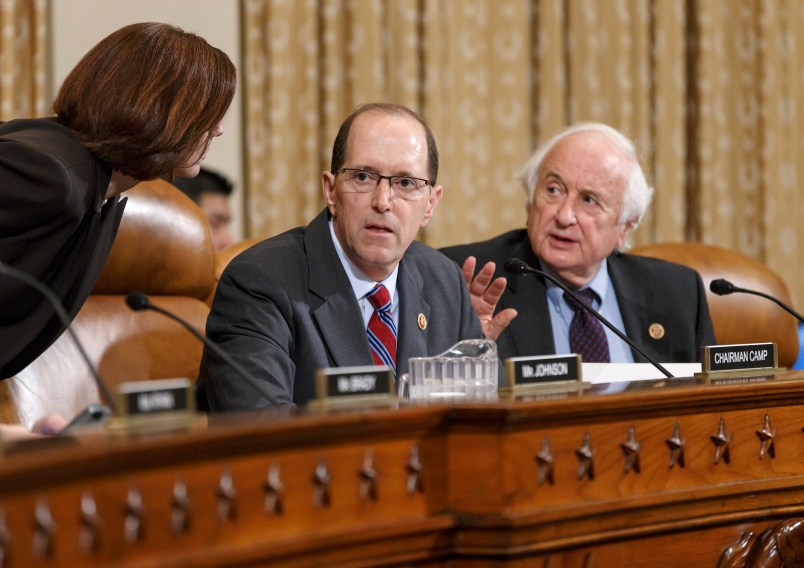The subpoena of a Republican House aide in a federal investigation of insider trading has unnerved some of his colleagues on the Hill — at least those who are paying attention.
The Securities and Exchange Commission earlier this year subpoenaed Brian Sutter, a staff director for House Ways and Means Chair Dave Camp (R-MI). The commission was investigating how a policy change for Medicare was leaked to Wall Street traders before it became public. The agency has since said in court filings that Sutter “may have been” the source of the leak, and it is currently battling with the House counsel’s office in court over whether Sutter should be forced to comply with the subpoena.
The subpoena of a congressional staffer is unusual. (Lawyers for the House say it is also unconstitutional.) That, paired with the fact that what Sutter is alleged to have done is considered unremarkable by some on the Hill, has sent a chill through certain congressional staffers who are following the case.
“The bottom line is if you share information that ends up moving the market, regardless of your intent or who you shared it with, my understanding is that you’re potentially in violation of the law,” a congressional aide who has been monitoring the situation closely told TPM. “I think there are a lot of congressional staffers who speak on a daily basis with their friends and colleagues off the Hill, without thinking for a second about what that might do to the stock market.”
The law at issue is the 2012 Stop Trading on Congressional Knowledge Act, which aims to prevent congressional members and their staff from benefitting financially from insider knowledge. The ongoing investigation has been focused on the April 2013 announcement that Medicare funding cuts for private insurers would be reversed. Information about that announcement leaked out in advance, prompting a civil investigation by the SEC as well as a criminal investigation by the Justice Department.
Both investigations have sent subpoenas to Sutter, though the Justice Department recently agreed to withdraw its own after Sutter’s attorneys provided information on his behalf. The SEC has pressed forward with its subpoena, going as far as to file a lawsuit against him after he and his committee refused to comply.
In its lawsuit, the SEC alleged its investigation turned up information showing Sutter spoke with a lobbyist about the reversal of funding cuts, which was being proposed by the Centers for Medicare and Medicaid Services. That lobbyist, according to the lawsuit, then passed the information to a private research firm, which in turn distributed a flash report to investors, sending shares of major insurance companies soaring.
TPM spoke with a dozen congressional aides, none of whom were involved in the ongoing investigation, about their experiences since the civil and criminal probes became public. None was willing to talk on the record because of the subject’s sensitive nature. The aides included those from both the House and Senate. Some of them worked for committees. Others for congressional offices.
There was a fairly even split between those who had been keeping tabs on the case and those who had not. Some declined to discuss the matter beyond acknowledging they were following it.
“It freaks me out,” one rank-and-file Democratic aide told TPM, echoing what some other staffers said.
Some who spoke with TPM said they were supportive of the House counsel’s efforts to defend Sutter against the SEC’s subpoena.
“I think there is a strong inclination, as there should be, for the House to protect itself from subpoenas and investigations from the executive branch,” one GOP aide said.
Committee and leadership staffers seemed to be more familiar with Sutter’s circumstances. That makes sense: They are generally responsible for setting Congress’s agenda and assume the oversight role for policy changes made by the administration. Sutter himself is a committee staffer.
And the thing is, according to one aide who’s following the case, some Hill staffers are routinely informed about policy announcements in advance. And they talk frequently with people in the private sector. The aide said the line between routine business and something that could lead to a subpoena from the SEC seems to have been muddied by the Sutter case.
“Where do people really have information? At the committee level and at leadership,” the same aide said. “You’d be surprised at how often the administration, when they’re doing stuff, they give us a heads up. It’s often not more than a half an hour, but in a situation like this, clearly it can come back to bite.”
While those who were familiar with the situation appeared united in their concerns about its implications, there were also the others who hadn’t even heard about Sutter.
“Well, I had to Google him, if that says anything,” one Senate aide said. But if Sutter were to be charged, another aide predicted, that could change quickly.







Cockroaches hate the light.
“You’d be surprised at how often the administration, when they’re doing stuff, they give us a heads up. It’s often not more than a half an hour, but in a situation like this, clearly it can come back to bite.”
Wait, I thought the White House never shared anything with Congress due to their ongoing effort to cover up that whole Benghazi mess. You know, the most important event of the 21st century.
The corruption is so blatant they don’t even realize they are doing it.
It’s Obama’s fault. How dare he give Congress a head’s up so that this poor innocent staffer can warn someone so that hedge fund’s can profit?
Because when you learn something, and have 30 minutes to act on it, the first thing you do is call a lobbyist.
Edited for errors on my part…
Simple solution - keep your mouths shut. Keep work separate from rest of your life. Think before speaking.